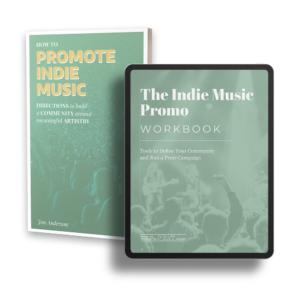I don’t usually like to write in this kind of format, but someone asked me the other day, “What are the biggest mistakes that indie artists make in promo?” and my head immediately started creating this listicle.
I wrote it down, so here you go.
In my estimation, the biggest mistakes indie artists make in promo are:
1. Spamming people.
Ha, you don’t do this, don’t worry. You’re doing great.
But the kid I kind of knew in high school who is trying very hard to become the next Post Malone has messaged me five times on Instagram about his latest single. I legitimately respect his effort, but I’m also tired of it.
Build relationships, don’t just push your music.
2. Thinking they have to do everything / be everywhere.
I’ve written about this in a few places because I think it’s important.
If you google “how to promote indie music,” you’ll nearly always get advice that tells you to be on social media. Some people explicitly tell you to be on as many platforms as you can. I think they’re wrong. You should be on social media. But being all-in on every social media platform is exhausting.
Pick the one platform you like the most and focus 80% of your efforts there. You can still post content to other channels, but you don’t have to go all-in – you can even automate it if you want.
Picking one channel to focus on will make your life way easier and will probably make your activity more effective.
3. Not having goals for promo.
I get a ton of messages to Two Story Media (my PR company) saying something to the effect of, “I want to get my music in front of people.”
This is a good desire, but when artists don’t frame it in terms of a goal, I don’t really want to take their money, because they probably don’t have accurate expectations about what PR will get them. If they pay me for blog placements and don’t see streams go through the roof, they’ll be disappointed.
Here’s what you should do: Document every platform you’re on and create a goal for each one. Set a timeframe in which you want to achieve your goal (I usually do three-month intervals). Then, focus on the promo activities that will be most likely to get you there.
This’ll help you crystallize your desire to “get in front of people” into something you can actually measure.
4. Not tracking your efforts.
You should create a Google sheet (or something similar) that tracks what you do for promo and its results so you can see what’s working and what isn’t.
You should do more of what’s working and less of what isn’t.
I wrote about this in more detail a few weeks ago, so I won’t rehash it again. You can check out the post here if you missed it.
5. Getting locked into a short-term focus.
I heard someone say that the secret to making music for a living is to keep making music.
I love that. The truth is that music is a long-term game, and you win if you keep playing.
Our world / our culture / our minds are very short-term focused (which is why I keep eating these freaking chocolate-covered espresso beans even though I know I’m going to regret the caffeine crash in three hours).
We love the instant gratification of getting added to a Spotify editorial playlist and seeing a spike in streams. We get hyped when our music gets covered in Atwood Magazine. That stuff is great – but if you’re serious about making music, you have to zoom out to see the big picture. If you don’t, you’ll end up dying on small hills.
Long-term thinking means a) being consistent over time and b) not getting wrapped up in short-term results.
In my blog coverage course, I mention that it’s only worth doing blog promo the month or so after your song is out. It’s true, because blogs are way more likely to cover new music. What isn’t true, though, is that your music only matters for the month or so after it’s out.
Your music matters, period.
A song you write today could change someone’s life in ten years. Bob Dylan has made me cry with songs that were written before I was born.
It’s even possible to go viral years from now with songs you write today. One of the artists I covered last year wrote a song that sat in relative obscurity for eight years, only to get millions of streams when COVID hit. The track resonated with people in that moment and it started catching, waaay after he’d released it. If he’d judged its success based on the week or month or year after release, he’d have been wrong.
The point is, don’t live and die with streams or likes on a day-by-day basis. Work at promo, but take the long-term view.
Keep making music.
Because the actual biggest mistake you can make as an indie artist is to not do that.

